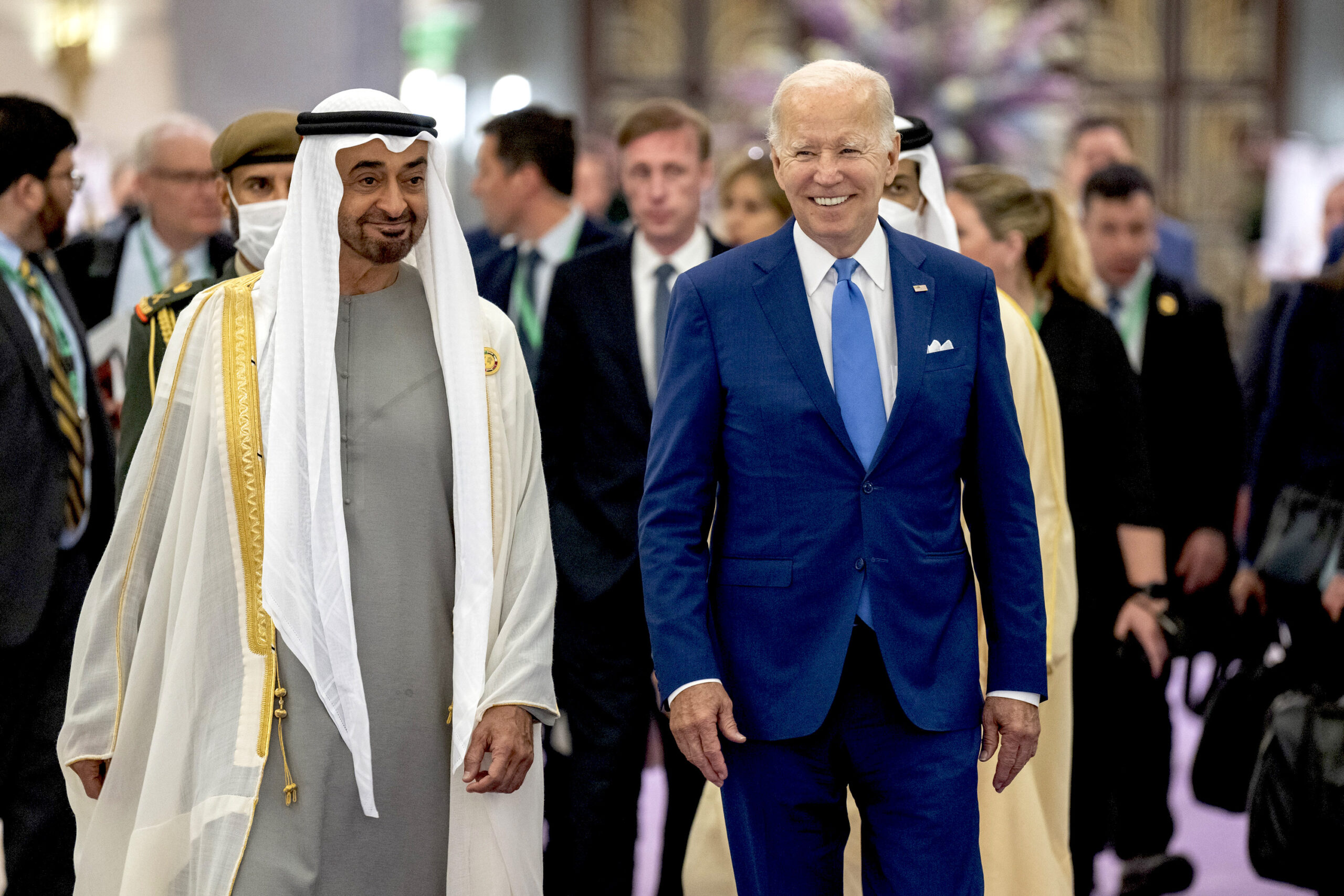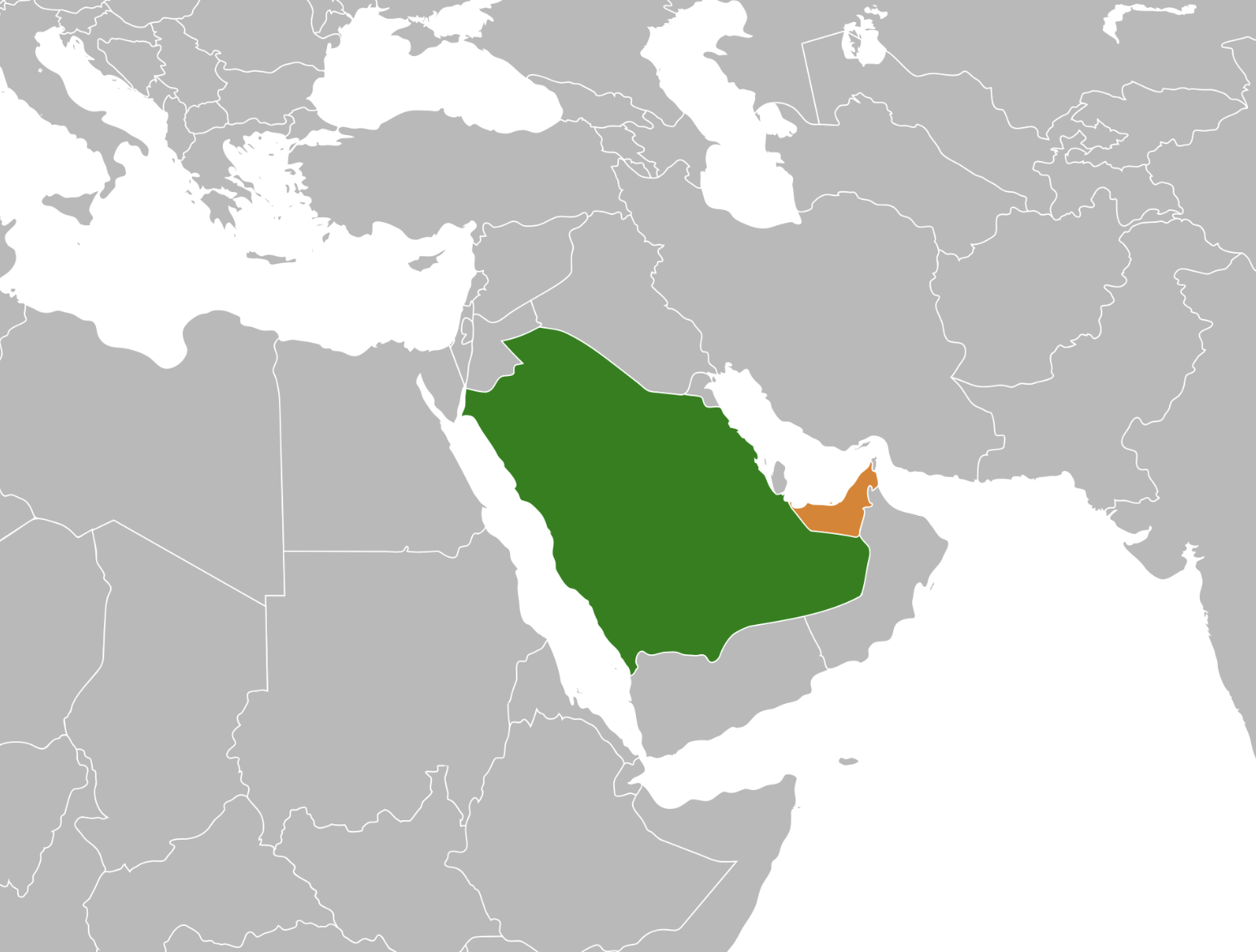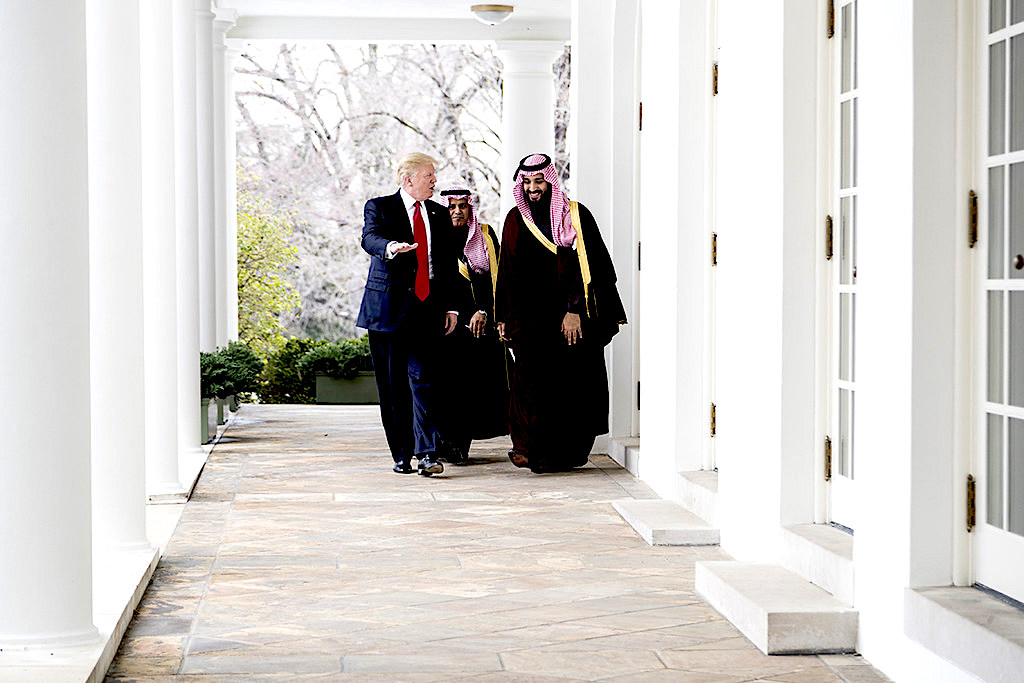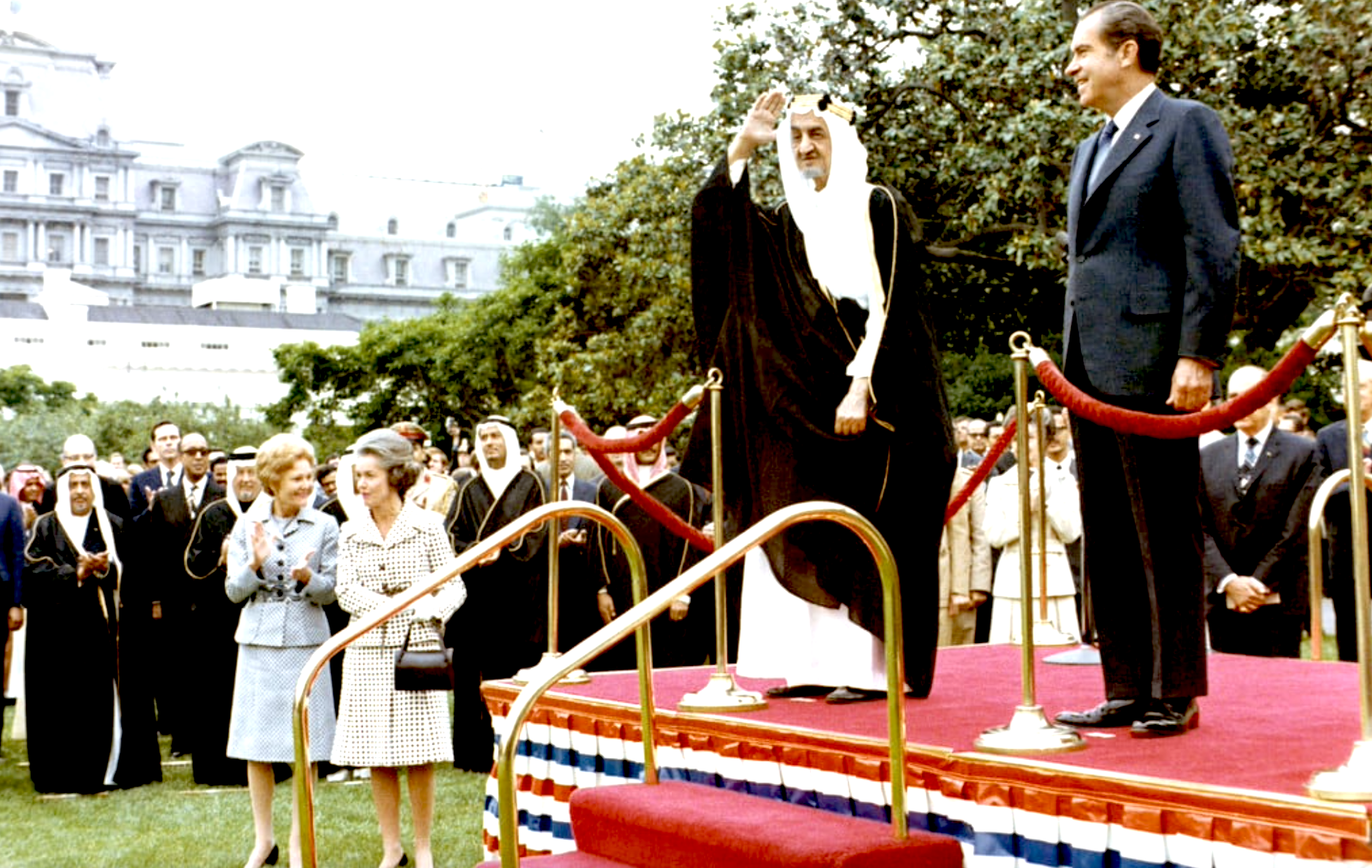The Emirates’ status in Washington is a story of extensive lobbying, generous funding and rapprochement with Israel regardless of the latter’s war crimes in the region.

UAE President Mohamed bin Zayed Al Nahyan, or MbZ, with U.S. President Joe Biden at the GCC+3 summit in Jeddah, July 2022. (The White House, Wikimedia Commons, Public domain)
By As`ad AbuKhalil
Special to Consortium News
 The United Arab Emirates has enjoyed excellent press in the West; not that the kingdom has stayed out of trouble in the Middle East or maintained neutrality in the various conflicts and wars raging around them.
The United Arab Emirates has enjoyed excellent press in the West; not that the kingdom has stayed out of trouble in the Middle East or maintained neutrality in the various conflicts and wars raging around them.
Far from it. The U.A.E. has in fact instigated — and added fuel to — the fires of many wars and conflicts in the region. The reason for its favorable treatment in the West has to do with the enormous wealth of the country and the competition in the West to sell the the Emiratis high-end military equipment, from advanced arms to planes.
The U.A.E. achieved the status it enjoys in Washington, D.C. through extensive lobbying, generous funding and rapprochement with Israel regardless of the latter’s war crimes in the region.
When Mohammed bin Zayed (MbZ) ascended to the throne (even when his brother Khalifa Ben Zayed was the nominal ruler) he dispatched a close aide, Yusuf Otaiba, to Washington as ambassador to the U.S. to promote military and intelligence relations between the countries.
Like the former Saudi Ambassador Prince Bandar before him, Otaiba quickly reached the conclusion that the road to the heart of Congress must pass through AIPAC, the legendary Israeli lobby. Otaiba’s generation of Arab Gulf leaders is unburdened by any emotions or passions regarding Palestine; and present-day Gulf despots don’t have to look over their shoulders in anticipation of speeches by Gamal Nasser in which the Egyptian leader would mobilize the Arab masses from the Gulf to the ocean.
The relationship among countries of the Gulf has never been harmonious, but the U.S. exerted its influence immediately after the 1979 Iranian revolution to push them into a security arrangement (the Gulf Cooperation Council, founded in 1981) to fend off Iranian danger and threats, alleged or real, and to distance the Gulf political order from the Arab core regarding the Palestinian question.
Relations With Riyadh

Map showing Saudi Arabia, in green, and United Arab Emirates, in orange. (Quintucket, Wikimedia Commons, CC0)
The foreign policy of the U.A.E. is centered on a variety of intersecting aims and calculations:
Firstly, the superficially assumed alliance between the U.A.E. and Saudi Arabia obscures the longstanding rivalries and differences between the two countries.
When Muhammad bin Salman first ascended to the Saudi throne (even as crown prince in 2017), bin Zayed, as U.A.E. leader, served as his sponsor and promoter in Washington circles.
His ambassador in D.C. made the rounds to convince skeptics that the draconian, tyrannical measures being undertaken in Riyadh — and the arrest of bin Salman’s most seniors cousins and uncles — should not worry the U.S. government.
Bin Zayed wrongly assumed he would then emerge as the undisputed leader of the Arab world having controlled the new untested, Saudi ruler.
But bin Salman quickly broke from under the control of the U.A.E. ruler and exposed ambitions that were much wider than those of his neighbor.

President Donald Trump with Mohammed bin Salman bin Abdulaziz Al Saud, or MbS, then the deputy crown prince of Saudi Arabia, in March 2017. (White House/Shealah Craighead)
Neither in Saudi Arabia nor in the Arab world was bin Salman willing to play second fiddle; he alone would decide the affairs of the Gulf and indeed the affairs of the Arab world.
And if bin Zayed succeeded in solidifying a strong security and intelligence alliance with the state of Israel, the Saudi ruler was willing to go as far as bin Zayed without quite committing to a declared peace treaty with Israel.
The considerations for such a step are far more complicated for a ruler who brandishes the title of the Servitor of the Two Holy Mosques of Islam.
Saudi Arabia has been subjected to decades of fanatical religious indoctrination that included elements of anti-Semitism and declared slogans of jihad, not only against Israel but against Jews in general.
King Faisal — a highly respected and praised royal in Western capitals — never made an attempt to conceal his anti-Semitism. As long as he was allowing the oil to flow to the West he could do no wrong no matter how repugnant the Saudi rhetoric was regarding Jews and Judaism. King Faisal even banned Jewish people from entering the kingdom; although an exception was made for Henry Kissinger.
Joint War Against Yemen

King Faisal and U.S. President Richard Nixon during an arrival ceremony for the Saudi royal at the White House; Pat Nixon on left, May 1971. (U.S. National Archives, Public domain)
Secondly, bin Salman and bin Zayed started the war against Yemen in 2015 as a joint effort to unseat the Houthis from power. Their armies were supposed to collaborate and liberate Yemen, and place it under the control of subservient lackeys.
As is well known by now, the war has dragged on and the Saudis and Emirates could not advance despite savage air bombardment against civilian targets inside the country, creating one of the worst humanitarian crises in the world before the genocide in Gaza.
A few years into the war in Yemen the goals of the two countries diverged and the U.A.E. started to establish its own zone of influence in the South of Yemen without consulting Saudi Arabia. And when the war faltered the U.A.E. packed up and left also without much consultation with Saudi Arabia.
Thirdly, the U.A.E. was emerging from its inward foreign policy which, since its founding in 1971, had avoided friction or conflicts with other Arab countries.
The founding ruler, Sheikh Zayed, coordinated closely with the Saudi government and also with the United States while carefully avoiding offending orientations of Arab public opinion. He personally invited Leila Khalid of the Popular Front for the Liberation of Palestine, or PFLP, (the famous plane hijacker and revolutionary) into the U.A.E. and made a donation to her cause.
This would be unimaginable today when the sons of Zayed are conspiring directly with the Mossad to facilitate the assassinations of Palestinian leaders, even inside Dubai itself.
Bin Zayed’s ambition is to mimic the role of Israel and serve Western imperial interests and agendas. Towards that aim, he participated in the U.S. military efforts in Afghanistan and Iraq.
Moreover, in the last 20 years, his military became, especially after the era of the Arab uprisings, involved in Somalia, Sudan, Yemen and Libya. The U.A.E. enjoys close military and intelligence relations with many Arab countries and its creation of an all pervasive surveillance apparatus drew the envy of many of the regions’ tyrants.
Fourthly, the U.A.E. wishes to maintain its close relationship with the United States, but hasn’t been satisfied to merely receive the same amount of U.S. military technology as Saudi Arabia. One of the first fruits of the U.A.E.’s announcement of peace with Israel was the American pledge to reward it with more advanced military hardware.
The U.A.E. wants to prove its usefulness to NATO and to Israel. But it has thus far avoided allowing a massive military base for U.S. troops on its territory as Bahrain and Qatar hav done (the U.A.E. houses, however, a not-so-secret American intelligence base).
Meddling in North Africa

From left: UAE’s Minister of Foreign Affairs Abdullah bin Zayed Al Nahyani, Israeli Prime Minister Benjamin Netanyahu, Bahrain’s Minister of Foreign Affairs Abdullatif bin Rashid Al-Zay and U.S. President Donald Trump during the signing ceremony for the Abraham Accords, Sept. 15, 2020. (White House, Joyce N. Boghosian)
In the current affairs of the Arab world, the U.A.E. is highly active in Sudan, aligning itself with the Rapid Support Forces (RSF) who are heavily engaged in the civil war in that country.
The Sudanese Army chief (who is the actual head of state) explicitly accused the U.A.E. recently of causing death and destruction in his country in alliance with the RSF, whose head is also a close tool of the Mossad. It would be unlikely then that the U.A.E.’s efforts are not closely coordinated with the Israeli government.
The U.A.E. is active also in Libya where it supports all political forces (especially the notorious Field Marshal Khalifa Haftar) who are aligned against the Islamists of the Muslim Brotherhood genre, who are aligned with Turkey. The U.A.E. has made it very clear that the Muslim Brotherhood is its enemy, along with those Shiite groups hostile to Israel.
The most embarrassing development for the U.A.E. were recent remarks by the Algerian president in which he criticized interventions by “an Arab state” in the affairs of his country. It was clear that he was talking about the U.A.E. and U.A.E. officials and propagandists quickly responded in kind.
Algeria expelled U.A.E. citizens who it accused of spying for the Mossad. Furthermore, Algeria was displeased with U.A.E. investments in the tobacco sector which the government expected to be profitable.
Most importantly, the U.A.E. sheltered the brother of the former president of Algeria, Abdelaziz Bouteflika, who embezzled millions from the treasury.
The U.A.E. also puts pressure on neighboring Mauritania to normalize relations with Israel. In the Moroccan-Algerian conflict, the U.A.E. sides with Morocco (another country run by a close ally of the Mossad).
The U.A.E. likes to cultivate an image of peace and tolerance in an area of extremism. But the state that MbZ has constructed could qualify as the most totalitarian state in the Arab world. It has surpassed Saddam’s “republic of fear” but avoided mass killing internally, where the small population enjoys decent living standards with zero political rights.
Yet, as long as the U.A.E. maintains its close alliance with Israel, U.S. congressional support for the ruling despot is guaranteed for years to come. The war in Gaza and the passions it has ignited in the Arab and Muslim world, however, are likely to make the U.A.E. ruler more unpopular than ever, at least outside of his fiefdom.
As`ad AbuKhalil is a Lebanese-American professor of political science at California State University, Stanislaus. He is the author of the Historical Dictionary of Lebanon (1998), Bin Laden, Islam and America’s New War on Terrorism (2002), The Battle for Saudi Arabia (2004) and ran the popular The Angry Arab blog. He tweets as @asadabukhalil
The views expressed are solely those of the author and may or may not reflect those of Consortium News.

In response to Vera Gottlieb, indeed! These wars are so obviously between old imperialist and colonialist powers who still and will never give up trying to take advantage of other nations/peoples; taking their rights and riches only to enrich their own because they never seem to have enough. These powers don’t know how to let go of what is required of them to enhance saving the world from climate warming: to let go of their “rights and riches and influences” in a world in which we all face a same problem that requires excellent skills in diplomacy and getting along on a world wide playground that we all win if we all get along and the bullies learn to be part of the “team.” It boggles the mind that people inside our country killed the leaders who knew how to operate in such a manner. Our nation has gone downhill since. I wonder since these nations who select war yet refuse to directly address how war affects climate change can be trusted to address anything else, yet they pretend to. And the crazy part is (many crazy parts), we are supposed to believe what they say when all MSM repeats the same and no one digs into the dirt. Even some alternative media is “capitalizing” on the disbelief in MSM with attention getting headlines like Epoch News. I’m hanging with those who have a history. Wish people looking for news sources to believe had somewhere to go where they tell you about Robert Parry.
How disgustingly revolting this hypocritical arse kissing that goes on and on…
So if sovereign funds invest in the US military corporations they may profit from buying arms from us too and from our wars. If so would that be an incestuous relationship as an imminent threat to human civilization and maximizing profit motives.
Interesting. I have the impression the Saudis under binSalman have started to distance themselves from the US (ie, started to assert their independence). I wonder if the UAE is not far behind in this regard and what the consequences will be for US Middle East foreign affairs and for Israel.
Most interesting. Worth noting as well is the joint usurpation / occupation by the UAE and Israeli intel of Socatra Island, a longtime Yemeni-recognized strategic territory at the southern entrance to the Red Sea. And closer yet to the Horn of Africa.
For a number of years Saudi Arabia too was in the running to impress the locals of Socatra with gifts, construction of schools and mosques, etc, even as the UAE did the same. It was only in the latter years of the war that the UAE appears to have achieved dominance and brought along its no doubt unwanted and reviled hitch-hiker. Lately the word is out that the U.S. has decided to build a base there as well. Asking permission of nobody, no doubt. I’m shawckt! Truly shawckt!